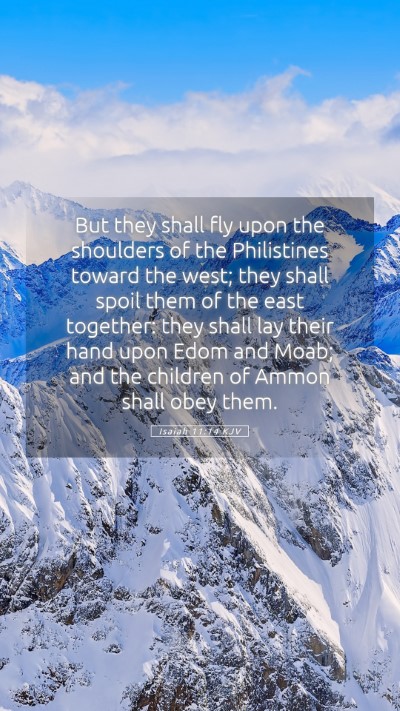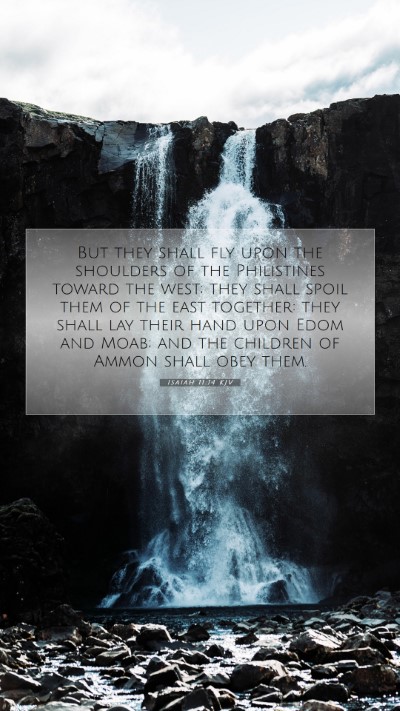Understanding Isaiah 11:14: Insights and Commentary
The verse Isaiah 11:14, which states, "But they shall fly upon the shoulders of the Philistines toward the west; they shall spoil them of the east together: they shall lay their hand upon Edom and Moab; and the children of Ammon shall obey them.", carries profound significance in biblical prophecy and the hope of future restoration and victory.
Bible Verse Meanings and Interpretations
This passage speaks to a time when God's people will rise against their enemies and experience victory. It suggests a restoration of Israel and a triumph over historical adversaries, specifically the Philistines, Edomites, Moabites, and Ammonites. The prophetic language indicates a future where the formerly oppressed will assert their authority and reclaim what has been lost.
Historical Context
To fully grasp the meaning of Isaiah 11:14, it is essential to consider the historical backdrop. Isaiah prophesied during a tumultuous period for Israel, where nations like Edom, Moab, and the Philistines were not only enemies but also represented the challenges and injustices faced by Israel. Thus, understanding the relationships between these nations during that era is crucial for any Bible study insights.
Insights from Public Domain Commentaries
-
Matthew Henry's Commentary
According to Matthew Henry, this verse alludes to the promises of God to His people, indicating that they will enjoy a state of victory over their enemies. Henry aligns this with themes of divine retribution and restoration, emphasizing that the restored Israel will not only exist in peace but also assert dominance over former foes.
-
Albert Barnes' Notes on the Bible
Albert Barnes notes that this passage illustrates the power and unity of Israel after its restoration. He highlights the implication of flying "upon the shoulders of the Philistines," signifying swift movements and decisive actions against adversaries. This metaphorical language conveys the strength and support God would provide to His people in overcoming those who once tormented them.
-
Adam Clarke's Commentary
Adam Clarke offers an intriguing perspective, relating this prophecy not merely to the nation of Israel but also to spiritual implications. He views the "children of Ammon" and others as representing all nations that would ultimately recognize God's sovereignty. Clarke emphasizes the broader implications of this restoration, where all nations will come to honor God, showcasing a universal redemption theme in Scripture.
Biblical Exegesis and Analysis
The scriptural interpretation of Isaiah 11:14 serves as a vivid reminder of God's faithfulness to His promises. The phrase "fly upon the shoulders" symbolizes a divine empowerment that allows the oppressed to overcome their trials. In terms of Bible verse commentary, this passage challenges readers to consider not only the geopolitical implications at the time of Isaiah but also the spiritual warfare faced by believers today, defending against various 'Philistines' in their lives.
Application of Isaiah 11:14
In contemplating how to interpret Bible verses like Isaiah 11:14, we can draw several applications for modern believers:
- Encouragement in Trials: Just as Israel anticipated deliverance, individuals can find solace in the promise of God's aid amid personal battles.
- Victory Through Divine Assistance: This passage affirms that, with God's help, believers can conquer life's challenges.
- Unity and Healing: The restoration theme encourages communities to strive for reconciliation and healing, reflecting God’s original intention for His people.
Related Bible Cross References
- Isaiah 2:4: "And he shall judge among the nations, and shall rebuke many people: and they shall beat their swords into plowshares, and their spears into pruning hooks."
- Isaiah 54:17: "No weapon that is formed against thee shall prosper; and every tongue that shall rise against thee in judgment thou shalt condemn."
- Micah 4:3: "And he shall judge among many people, and rebuke strong nations afar off; and they shall beat their swords into plowshares, and their spears into pruning hooks."
Conclusion
In summary, Isaiah 11:14 encapsulates a powerful message of hope and vindication for God's people. Through the insights gathered from significant commentaries, we can appreciate its depth and relevance today. Whether one seeks meaning of Bible verses or explanations of Scripture, Isaiah 11:14 serves as a vital reminder of God's redemptive power and faithfulness.


